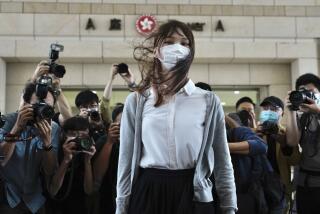Beijing Revokes Parole, Returns Dissident to Jail
- Share via
BEIJING — Chen Ziming, China’s “black hand” dissident paroled from prison last year under pressure from the Clinton Administration, has been returned to custody to serve out a 13-year sentence for sedition, apparently because of his recent participation in efforts aimed at a national reassessment of the 1989 Tian An Men Square incident.
Family members said police surrounded Chen’s home late Sunday night after revoking the research scholar’s medical parole. Chen, former director of a liberal think tank in Beijing, was named by the Chinese government as a “black hand” behind the 1989 mass demonstrations for political reform.
His rearrest was the latest blow to a reform movement already crippled by the arrest and detention of most top figures, including leading dissident Wei Jingsheng and student leader Wang Dan.
It also represents another slap at the U.S. Administration for allowing Taiwanese President Lee Teng-hui to visit the United States earlier this month.
Chen, 42, along with fellow “black hand” Wang Juntao, 36, was released from prison on medical parole in May of last year as a gesture to President Clinton, who a few days later announced the removal of human rights criteria for renewing favorable trade relations with China.
Wang left China for forced exile in the United States.
Chen, however, remained under virtual house arrest in his Beijing home, where relatives said he was undergoing treatment for testicular cancer. Despite government warnings that he stay out of politics, Chen recently signed a petition calling for a re-evaluation of the Tian An Men incident.
He also reportedly staged a one-day hunger strike to mark the June 4 anniversary of the army crackdown on Tian An Men demonstrators that resulted in hundreds--perhaps thousands--of deaths.
In the Sunday night raid on Chen’s home, relatives said, police confiscated tape recordings, documents and some recent writings.
For a time, it appeared that some Chinese authorities were open to a renewal of debate over the Tian An Men incident, which has marked the Chinese political culture in the way that the National Guard shootings at Kent State University in 1970 once affected the American political scene.
Earlier this year, for example, Chinese President and Communist Party leader Jiang Zemin visited the grave of former leader Hu Yaobang in Jiangxi province. It was the announcement of former party reform leader Hu’s death that sparked the first demonstrations in 1989.
But the Chinese authorities have acted harshly against dissidents, such as Chen and student leader Wang Dan, who have any history of organizing mass demonstrations.
More to Read
Sign up for Essential California
The most important California stories and recommendations in your inbox every morning.
You may occasionally receive promotional content from the Los Angeles Times.










